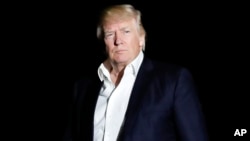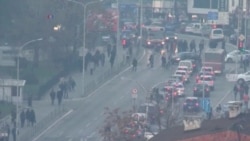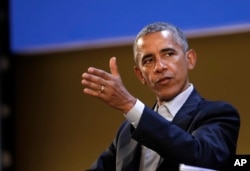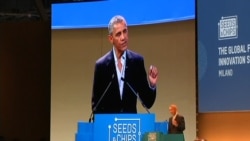The White House on Tuesday postponed for a second time a key meeting on whether the United States should withdraw from the international Paris climate change pact advocated by former President Barack Obama.
President Donald Trump vowed during his lengthy run for the White House to cancel U.S. involvement in the accord reached by 195 nations, but since assuming power has wavered.
Aides says he is moving toward a decision whether to honor the 2015 deal to curb greenhouse gas emissions to limit global warming, including a U.S. pledge to reduce its pollution over the coming decade. But the White House said no decision would be announced until after Trump returns from the G7 summit of leaders from the world's leading economies at the end of May in Sicily.
The United States is the world's second-biggest polluter, behind China, and withdrawing from the agreement would severely limit the global impact of the Paris pact. Obama and Chinese President Xi Jinping were instrumental in reaching the Paris deal.
No date was announced for a rescheduled White House climate meeting, with Trump facing conflicting views within his own administration on the issue.
Conflicting views within administration
Secretary of State Rex Tillerson, formerly chief of oil giant ExxonMobil, supports staying in the accord, but Scott Pruitt, administrator of the country's Environmental Protection Agency, says it "is a bad deal for America" that will cost some U.S. workers their jobs. Trump himself once called climate change a hoax perpetrated by China.
While the new Trump administration decides what to do, the Chinese foreign ministry quoted Xi as telling his French counterpart, newly-elected Emmanuel Macron, in a phone call that the two countries "should protect the achievements of global governance, including the Paris Agreement."
Obama speaks out
Former President Obama, appearing at a food innovation summit in Milan, said that “during the course of my presidency, I made climate change a top priority, because I believe that for all the challenges that we face, this is the one that will define the contours of this century, more dramatically perhaps than any other."
He added, "No nation, whether it’s large or small, rich or poor, will be immune from the impacts of climate change. We’re already experiencing it in America, where some cities are seeing floods on sunny days, where wildfire seasons are longer and more dangerous, or in our arctic state, Alaska, we’re seeing rapidly eroding shorelines and glaciers that are receding at a pace that is unseen in modern times.”
WATCH: Obama's remarks at Milan summit
The former president said climate change "is already making it more difficult to produce food. We’ve already seen ... shrinking yields and spiking food prices that in some cases are leading to political instability."
"And when most of the world’s poor work in agriculture, the stark imbalances that we’ve worked so hard to close between developed and developing countries will be even tougher to close," Obama said. "The cost will be borne by people in poor nations that are least equipped to handle it. In fact, some of the refugee flows into Europe originate not only from conflict, but also from places where there are food shortages that will get far worse as climate change continues.”








